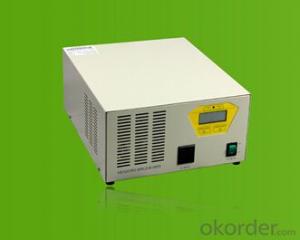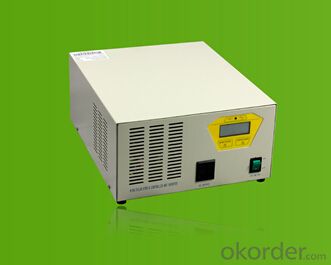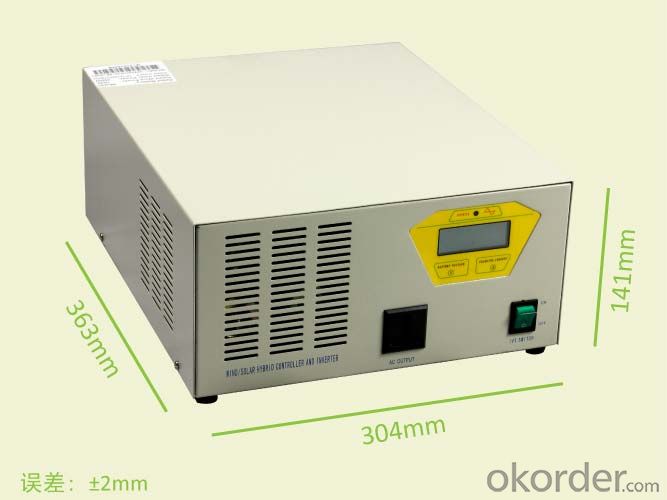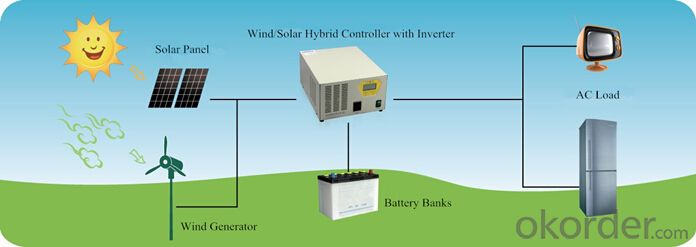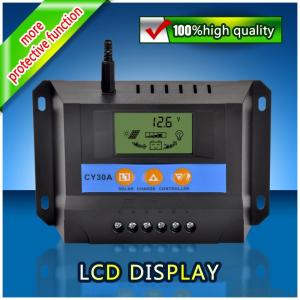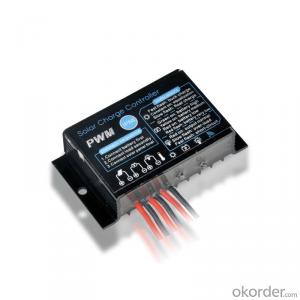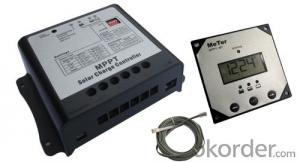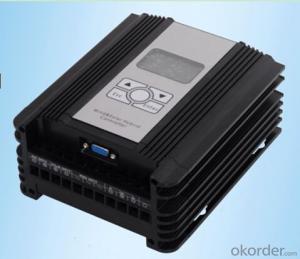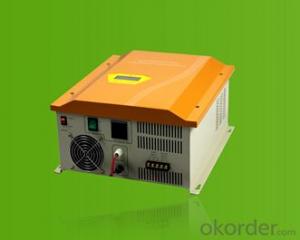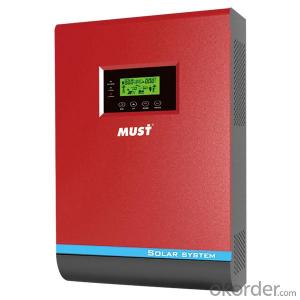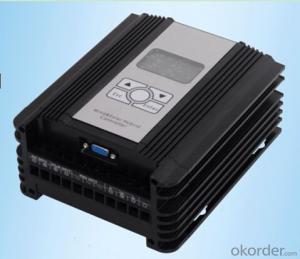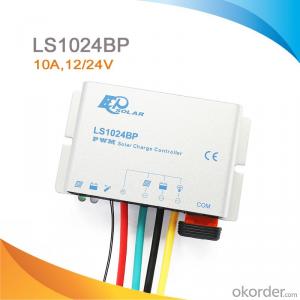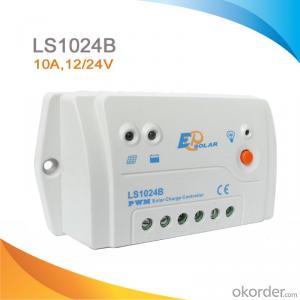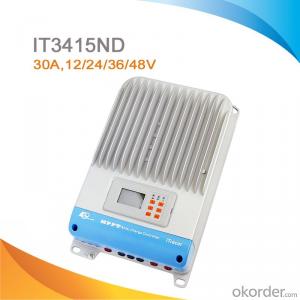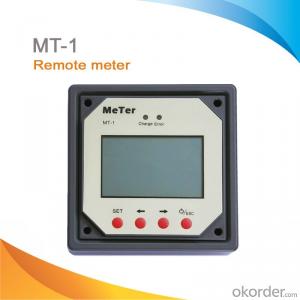Wind Solar Hybrid Controller with Inverter - Solar Controllers from Italy Supplier
- Loading Port:
- Shanghai
- Payment Terms:
- TT or LC
- Min Order Qty:
- 1 unit
- Supply Capability:
- 8000 unit/month
OKorder Service Pledge
OKorder Financial Service
You Might Also Like
I. PRODUCT INTRODUCTION
Wind/solar hybrid controller with inverter is the intelligent power supply with integration of wind/solar control and DC to AC inverse. The apparatus is mainly used for wind /solar renewable energy power system; provide effective power supply for traffic inconvenience, harsh environment of mountain area, a pasturing area, border, islands and other areas without electricity. With decent appearance, easy operation, and visual indication of LCD, the controller has perfect protection function, high charging efficiency and low no-load loss.
II. PERFORMANCE FEATURES
Perfect protection function, thus the system has higher reliability.
LCD display function, visually display battery voltage and charge current.
Integrated design of controller and inverter, with simple and easy maintenance.
PWM stepless unload mode, which burn excess power into dump load, making the battery charging in the best status.
Power frequency toroidal transformer, ensures inverter has high efficiency and low no-load loss.
Pure sine wave output, compared with square wave or modified wave, has higher efficiency and higher capability of driving load.
Certificate for Invention Patent of wind/solar hybrid controller with inverter, European CE.
III. APPLICATION AREAS
Domestic household wind power and photovoltaic power system, wind power station and photovoltaic power station.
Coastal islands, remote mountainous, border posts for regions shortage of or without electricity.
Government demonstration projects, landscape lighting project.
Mobile communication base station, expressway and other non-residential regions.
IV. 300W-500W TECHNICAL PARAMETERS
Product Model | WWSI0303-12 | WWSI0303-24 | WWSI0505-12 | WWSI0505-24 |
Rated wind turbine power | 300 W | 300 W | 500 W | 500 W |
Rated solar panel power | 90 W | 90 W | 150 W | 150 W |
Floating charging voltage | 14.5 V | 29 V | 14.5 V | 29 V |
Dump load current | 25 A | 13 A | 42 A | 21 A |
Rated inverter output capacity | 300 VA | 300 VA | 500 VA | 500 VA |
12 V | 24 V | 12 V | 24 V | |
Over voltage shutoff | 17 V | 34 V | 17 V | 34 V |
Over voltage recovery | 16.5 V | 33 V | 16.5 V | 33 V |
Battery over-discharge shutoff | 10.8 V | 21.6 V | 10.8 V | 21.6 V |
Battery over-discharge recovery | 12 V | 24 V | 12 V | 24 V |
No-load loss current | ≤0.9 A | ≤0.4 A | ≤1 A | ≤0.5 A |
Net weight | 9 kg | 9 kg | 11 kg | 11 kg |
Dimension | 370×300×130 mm | |||
Output wave | pure sine wave | |||
Display mode | LCD | |||
Cooling | Fan | |||
Rated output power | 110/120/220/230/240 VAC | |||
Wave distortion | ≤4% | |||
Output frequency | 50/60±0.5 Hz | |||
Dynamic response | 5% | |||
Power factor | ≥0.8 | |||
Over-load capacity | 120% 1min, 150% 10s | |||
Inverter efficiency | maximum 90% | |||
Isolating mode | frequency toroidal transformer | |||
Protection level | ||||
Noise (1 meter) | ≤40dB | |||
Insulating strength | 1500VAC,1min | |||
Protection function | Battery over-charge protection; battery over-discharge protection; battery reverse connection protection; output overload protection; output short circuit protection; overheating protection; solar reverse charge protection; solar reverse connection protection; automatic brake and manual brake protection; lighting protection | |||
Working temperature | -20~+55℃ | |||
Ambient humidity | ||||
Working altitude | ≤4000m | |||
In order to serve our customers better. Our company can adjust parameters configuration according to customer’s requirement. | ||||
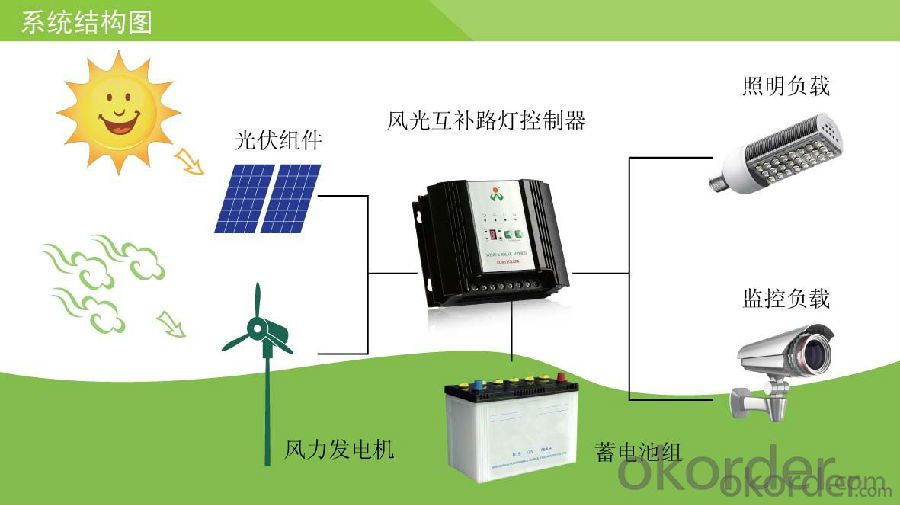
- Q: Can a solar controller be used with different types of solar panel cleaning systems?
- Different types of solar panel cleaning systems can be used with a solar controller. The solar controller is responsible for regulating and optimizing the charging and discharging of batteries in a solar power system. Its purpose is to ensure efficient and safe charging of batteries by controlling the flow of electricity from the solar panels. The functioning of the solar controller is not directly affected by the type of solar panel cleaning system used. Its main role is to manage the flow of electricity, and it does not have any specific compatibility requirements with different cleaning systems. However, it is important to consider the compatibility of the solar controller with the overall solar power system and the specific cleaning system being used. The controller should be capable of handling the voltage and current requirements of both the solar panels and the cleaning system. It is advisable to refer to the manufacturer's specifications and guidelines to ensure that the solar controller is suitable for the specific cleaning system being utilized.
- Q: How does a solar controller handle power fluctuations in the system?
- A solar controller handles power fluctuations in the system by regulating the flow of electricity between the solar panels and the battery bank. It continuously monitors the voltage and current levels, and if there are any fluctuations, it adjusts the charging or discharging rate accordingly to maintain a stable power output. This helps to protect the system from overcharging, over-discharging, and other potential damages caused by power irregularities.
- Q: Can a solar controller be used with solar-powered indoor cultural facilities?
- Solar-powered indoor cultural facilities can indeed utilize a solar controller. The purpose of a solar controller is to regulate the charging and discharging of batteries within a solar power system. Traditionally, solar power has been associated with outdoor applications such as residential or commercial buildings. However, it can also be effectively employed in indoor cultural facilities such as museums, art galleries, libraries, or exhibition halls that prioritize sustainability and environmental friendliness. Implementing a solar controller in these facilities offers several advantages. Firstly, it ensures that the solar panels efficiently convert sunlight into electricity and effectively charge the batteries. By controlling the energy flow, it prevents overcharging, which can potentially harm the batteries. As a result, a reliable and consistent power supply is guaranteed for the indoor cultural facility. Furthermore, a solar controller aids in monitoring the energy consumption of the facility. It provides real-time data on solar power generation, battery status, and overall energy usage. This valuable information enables facility managers to optimize energy consumption, identify any potential issues, and make well-informed decisions to enhance energy efficiency. Moreover, solar controllers often come equipped with built-in features like load control and timers. This allows facility managers to exercise control over the utilization of solar power within the indoor cultural facility. For instance, lights or climate control systems can be programmed to operate during specific hours or only when necessary. This approach minimizes energy wastage and maximizes the utilization of solar power. In conclusion, there is no doubt that a solar controller can be effectively employed in solar-powered indoor cultural facilities. It facilitates efficient energy conversion, enables energy consumption monitoring, and empowers control over solar power usage. By embracing the use of a solar controller, indoor cultural facilities can become more sustainable, reduce their environmental impact, and simultaneously maintain a reliable power supply.
- Q: Can a solar controller be used with solar-powered streetlights?
- Yes, a solar controller can be used with solar-powered streetlights. A solar controller regulates the charging and discharging of the solar battery, ensuring efficient power management. It helps to maintain the battery's health and prevent overcharging or discharging, thus extending the lifespan of the battery. Therefore, a solar controller is an essential component for the effective operation of solar-powered streetlights.
- Q: Can a solar controller be used in a remote location where grid power is not available?
- Yes, a solar controller can be used in a remote location where grid power is not available. Solar controllers are designed to regulate and control the charging of batteries from solar panels. They do not rely on grid power and can function independently in off-grid locations. This makes them ideal for remote areas where access to electricity from the grid is not feasible.
- Q: Can a solar controller be used with solar panels that are connected to a solar air conditioning system?
- Yes, a solar controller can be used with solar panels that are connected to a solar air conditioning system. A solar controller is typically used to regulate the charging and discharging of batteries in a solar power system. In the case of a solar air conditioning system, the solar controller can help manage the power generated by the solar panels and ensure that it is efficiently utilized to power the air conditioning unit. This helps optimize the system's performance and maximize energy savings.
- Q: Can a solar controller be used with a solar-powered CCTV system?
- Yes, a solar controller can be used with a solar-powered CCTV system. A solar controller helps to regulate and optimize the charging of the solar panels, ensuring maximum efficiency and safety. It also helps manage the power distribution to the CCTV system, protecting it from overcharging or discharging. Therefore, using a solar controller is essential for maintaining the reliability and longevity of a solar-powered CCTV system.
- Q: How does a solar controller prevent battery discharge during nighttime or low sunlight conditions?
- A solar controller prevents battery discharge during nighttime or low sunlight conditions by effectively blocking the flow of electricity from the battery to the solar panels. It senses the voltage of the battery and automatically interrupts the connection when it reaches a certain level, ensuring that the battery remains charged and preventing any energy loss.
- Q: Can a solar controller handle multiple solar panels?
- Yes, a solar controller can handle multiple solar panels. Solar controllers are designed to regulate the charging process of solar panels and manage the power output. They can be connected to multiple solar panels, allowing for efficient and effective utilization of solar energy.
- Q: How do you prevent short-circuiting of solar panels with a solar controller?
- A solar controller helps prevent short-circuiting of solar panels by regulating the flow of electricity from the panels to the battery or load. It uses various protective mechanisms like overcurrent protection and overvoltage protection to ensure that the electrical output from the panels remains within safe limits. Additionally, many solar controllers also provide temperature compensation to prevent overheating and potential short-circuits.
Send your message to us
Wind Solar Hybrid Controller with Inverter - Solar Controllers from Italy Supplier
- Loading Port:
- Shanghai
- Payment Terms:
- TT or LC
- Min Order Qty:
- 1 unit
- Supply Capability:
- 8000 unit/month
OKorder Service Pledge
OKorder Financial Service
Similar products
Hot products
Hot Searches
Related keywords
